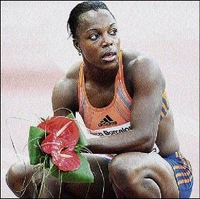Jamaica track controversy must stop - Bolt's manager fears infighting could cause long-term damage to nation's reputation
Published: Tuesday | August 25, 2009



( L - R ) Manager of Usain Bolt, Norman Peart, Quarrie, Francis - File
BERLIN, Germany:
Controversial issues which have plagued Jamaica's star-studded track and field teams at major international events recently, some which surfaced again before and during the IAAF World Championships in Athletics (WCA) which ended here Sunday, must be ironed out once and for all, according to a representative of the country's top athlete.
If not, the off-track issues could damage Jamaica's reputation worldwide and demoralise the athletes, who won 13 medals - seven gold, four silver and two bronze - at the 2009 WCA.
Sometimes you make some little judgement calls that are unnecessary and it cost us medals," Norman Peart, manager of Usain Bolt, the biggest name in the sport, who won the 100 and 200 metres gold in world record times and ran a leg on Jamaica's victorious 4x100 metres relay team, said Sunday.
Placard-carrying athletes
"It has cost us our integrity and I think that people need to think before they act. People need to know what they are here about.
"This is the best. This is the highest achievement for the sport. So you have to respect it. The sport has been here long before everybody and it will stay when everybody has gone. So respect is due and I think the sport should be put first."
At the 2000 Olympic Games in Australia, for example, several Jamaican athletes publicly protested the entry of sprinter Merlene Ottey in the 100 metres. The International Olympic Committee reportedly threatened to expel Jamaica from the Games if the protest, which featured placard-carrying athletes, didn't stop.
At last year's Olympics in China, there was a dispute involving athletes from MVP track club who did not join the other athletes for the start of a pre-meet training camp organised by the Jamaica Amateur Athletic Association (JAAA), the ruling body for track and field in Jamaica.
A similar training camp incident occurred before this year's WCA, and at one point there was uncertainty if MVP athletes, which include eventual champions Shelly-Ann Fraser (100 metres and 4x100 metres relay) and Melaine Walker (400 metres hurdles), would be allowed to compete.
In addition, an ugly incident surrounding the women's 4x100 relay reared on Saturday when Vero-nica Campbell-Brown withdrew from the team, claiming she was informed only 90 minutes before the final that she would not run the anchor leg which she had practised at Jamaica's camp before the WCA. Campbell-Brown called the team's management "unprofessional".
Jamaica must correct its approach to the issues if the country is to cash in on the current athletes' success, especially in the glamorous sprinting events, rather than squabbling, said Peart.
"I mean, we have to get it right," he said, "because we are on top of the world in sprinting now."
Peart claimed that public bickering between athletes - or their management - and the JAAA had not yet reached the stage where the performances on the track were being overshadowed. Still, he feared that the disputes could escalate and compromise team morale.'"In some cases it seems really dangerous," Peart said. "In other words, some of the issues fever-pitched and could have really wrecked some of the relay teams, some the sprint events and stuff like that.
"So I think we need to have clear policies before we begin and sometimes people need to compromise. But at the same time, we need to put our foot down in cases where stuff is blatant. It's a matter of people getting their hands on the handle of things."
Problems taking toll
Without pointing a finger at any individual, Peart said the onus is on Jamaica's team management to fix the problems at the major meets. And while not referring to the Campbell-Brown incident on Saturday specifically, he added that the problems have already started to take their toll on the athletes.
"Well it should, I mean especially for those who are affected, because you don't want to come to a championships being stressed, having to wonder, 'Will I run, will I not run?'" Peart said. "That's not good enough, you know. A relay team is four people and if something is going to be wrong with somebody you think ought to be there, it's going to be an issue.
"We need to look at what is important, really, you know," he added.
But Peart stopped short of calling for wholesale changes at the JAAA, although he believes tighter, more efficient management is needed, including decisive leadership.
"The people in the JAAA are people who have been there over the years and they are very resourceful," he said. "So it's not so much to get rid of somebody, whatever. These people know the stuff. So it's just to make sure it's channelled properly. They know the whole operations.
"We need to manage. We need to have a handle on things really. Just to have a handle on things to know who is in charge."

Campbell-Brown






















